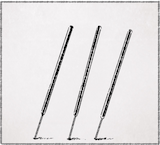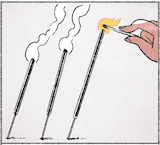

นี้คืออี่หยัง นี้คือทูบ ทูบสามดอก เสียบเฮียงกันอยู่
ทูบเอาไว้เฮ็ดหญัง ทูบเอาไว้จุด ทูบเอาไว้บูชา เอาไว้ไหว้พะ
คนสาสะนาพุด สิใซ้ทูบไหว้พะ หลือขอพอนสิ่งต่างๆ
ทูบมันหอมบ่ แล้วแต่ยี้ฮ้อทูบ ยี้ฮ้อทูบใดหอม มันกะหอม ยี้ฮ้อทูบใดบ่หอม มันกะบ่หอม
5
เขากำลังเฮ็ดหญัง เขากำลังจุดทูบ เขาใซ้ไม้ขีดจุดทูบ
จุดทูบสามดอก ตอนนี้เขาจุดไปแล้วสองดอก เขากำลังจุดดอกที่สาม
ทูบมันหอมบ่ กะหน้าสิหอมอยู่ แต่ว่าบางยี้ฮ้อกะบ่หอม บางยี้ฮ้อกะหอม
ตอนนี้มันมีควนบ่ มีอยู่ มีควนพ้อม เพาะว่าเขากำลังจุด มันกะเลยมีควนพ้อม
แล้วตอนนี้กำลังจุดดอกที่สาม ดอกที่สามกะกำลังมีเปวไฟพ้อม
Link to overview page
Link to dictionary
| Isaan | Pronunciation | Tones | Thai | English/Notes |
|---|---|---|---|---|
| นี้ | ni: | HF | นี้ | 1. this 2. here |
| คือ | khʉ: | HR | คือ | 1. to be, to resemble, like, as 2. why {บักหล้าคือบ่เก็บโต่ะแน่ = [addressing a young boy] Why haven't you cleared the table?} |
| อี่หยัง | i:-yaŋ | H-M | อะไร | 1. what {นี้คืออี่หยัง = What is this?} {มื้อนี้เจ้าเฮ็ดอี่หยัง = What are you doing today?} {กินเข้างายกับอี่หยัง = What did you have for breakfast?} 2. something, anything, (in negations) nothing {บ่ต้องเฮ็ดอี่หยังอีกเลยนอกจากใส่ปุย = [we] don't need to do anything besides adding fertilizer} |
| ทูบ | thu:p | HF | ธูป | incense stick |
| สาม | sa:m | M | สาม | three |
| ดอก | dɔ:k | LF | ดอก | clf. for keys, nails, incense sticks {ธูปสามดอก = three incense sticks} |
| เสียบ | si:ap | LF | เสียบ | to insert, to put in {เสียบปั่ก = to plug in} {ใซ้ซ้อนส้อมเสียบลูกซิ้น = to pick up meat balls with a fork} |
| เฮียง | hi:aŋ | HR | เรียง | 1. to line up, to stand in a row {มีพุซายสามคนยืนเฮียงกันอยู่ = three men are standing in a row} 2. to arrange Notes: see also เลียง |
| กัน | gan | M | กัน | mutual, each other, with another, together {เขากำลังนั่งเว้ากัน = they're sitting and talking} {เขาสองคนฮักกัน = they love each other} {ปาสองโตนี้ ใหญ่ห่างกันหลายบ่ = These two fish here, are they very different in size (from each other)?} {ต่างกัน = to be different (from each other)} {ก่องอันไหนหนักกว่ากัน = Which box is heavier (than the other(s))?} |
| อยู่ | yu: | H | อยู่ | 1. to be (located) at 2. yet, still 3. auxiliary indicating continuous or progressive action {ทอดปาอยู่ในกะทะ = (in the process of) frying a fish in the pan} {แม่กำลังเมี้ยนเฮียนอยู่ = mother is cleaning/tidying up the house} |
| เอา | ao | M | เอา | to take, to give {เขากำลังเอาก่องไปซั่ง = he's taking the boxes to weigh them} {หมอกำลังเอายาให้คนป่วยกิน = the doctor is giving medicine to the patient} {เอาไว้ถ้า = is for, is used for, has the purpose of} |
| ไว้ | wai | HF | ไว้ | 1. to keep, to put, to place, to retain, to save, to reserve {เขาเอาหัวของเขาไว้ใส = Where does she put her head?} {หมาสิเลี้ยงไว้บ้าน = dogs are kept/raised in the house} {ไก่เลี้ยงไว้ในคอก = chicken are kept/raised in a coop} {หน้ามันบังไว้ = the face is covered/not visible} {เขาเอาโทละสับวางไว้หู = he holds the phone to his ear} 2. for {นาลิกาปุกมีไว้เฮ็ดหญัง = What is an alarm clock for?} {หม้อเอาไว้เฮ็ดแนวกิน = a pot is used to make food} {ก่องเอาไว้เฮ็ดหญัง ก่องเอาไว้ใส่ของ = What is the box for? It's for putting in stuff.} Notes: see also ไว้ถ้า |
| เฮ็ด | het | H | ทำ | to do, to make |
| หญัง | ɲaŋ | M | อะไร, เป็นหญัง = ทำไม | 1. what {เขากำลังเฮ็ดหญัง = What is he doing?} {ธูปเอาไว้เฮ็ดหญัง = What are incense sticks for?} 2. something, anything, (nothing) 3. เป็นหญัง[...]คือ in initial position: why {เป็นหญังเขาคือใส่บักพิกลงไปในกวยเตียว = Why is he putting chili in [his] noodle soup?} {เป็นหญังหน้าต่างมันคือเปิด = Why is the window open?} {เป็นหญังมันคือมีควนไฟ = Why is there smoke?} |
| จุด | jut | M | จุด | 1. to light sth. {จุดธูป = to light an incense stick} {จุดเทียน = to light a candle} 2. point, place {จุดเป้าหมาย = destination (e.g., of a trip)} |
| บูชา | bu:-cha: | M-HR | บูชา | to worship, to revere |
| ไหว้พะ | wai-pha | LF-H | ไหว้พระ | to pay respect to the Buddha (or a Buddha image) |
| คน | khon | HR | คน | person, people |
| สาสะนาพุด | sa:-sa-na:-phut | M-M-HR-H | ศาสนาพุทธ | Buddhism |
| สิ | si | M | จะ | future tense auxiliary {เขากำลังสิตื่น = he's about to wake up} {สิไปตะหลาด = [I'm] going to the market} |
| ใซ้ | sai | HF | ใช้ | to use |
| หลือ | lʉ: | M | หรือ | or |
| ขอ | khɔ: | M | ขอ | 1. to ask for, to request 2. please |
| พอน | phɔ:n | HR | พร | blessing, good wishes |
| สิ่ง | siŋ | H | สิ่ง | thing, object |
| ต่างๆ | ta:ŋ-ta:ŋ | H-H | ต่างๆ | different, various |
| มัน | man | HR | มัน | it (also used to refer to people) |
| หอม | hɔ:m | M | หอม | to smell good, to be fragrant |
| บ่ | bɔ: | H | ไม่ | 1. no, not 2. question particle, transforming a statement into a question Notes: spelling exception in line with common usage on social media |
| แล้วแต่ | lɛ:o-tɛ: | HF-H | แล้วแต่ | up to, depending on |
| ยี้ฮ้อ | yi:-hɔ: | HF-HF | ยี่ห้อ | brand, brand name |
| ใด | dai | M | ใด | 1. which, that one which, what, how {เขานั่งแบบใด เขานั่งขดตะหมาดอยู่ = How is he sitting? He's sitting cross-legged.} {ตอนใด = when?} 2. whichever, whoever {หม้องใดหม้องหนึ่ง = some place, somewhere} {ขั้นเฮาอยากตื่นญามใด เฮากะตั้งเวลาปุกญามนั้น = If we want to get up at a certain time, we set the alarm to that time} Notes: sentence-final often with a marked rising tone |
| กะ | ga | M | ก็ | 1. then, consequently 2. also |
| เขา | khao | M | เขา | personal pronoun: he, she |
| กำลัง | gam-laŋ | M-HR | กำลัง | auxiliary indicating continuous or progressive action |
| ไม้ขีด | mai-khi:t | HF-LF | ไม้ขีด | match |
| ตอนนี้ | tɔ:n-ni: | M-HF | ตอนนี้ | now |
| ไป | pai | M | ไป | 1. to go 2. auxiliary indicating action extending into the future |
| แล้ว | lɛ:o | HF | แล้ว | 1. finished 2. already 3. and then, and next (especially แล้วกะ) 4. auxiliary for past tense |
| สอง | sɔ:ŋ | M | สอง | two |
| ที่ | thi: | H | ที่ | 1. that, which {คนที่ยืนอยู่ฝั่งขวา = the person which is standing on the right = the person standing on the right} {เว้าคำที่บ่สุพาบ = to speak words which are impolite = to speak impolitely} 2. for ordinal numbers {ที่สาม = third} |
| หน้า | na: | LF | หน้า | 1. front {ปะตูหน้า = front door} 2. face {เขากำลังล้างหน้า = he's washing his face} 3. auxiliary: conditional tense {เขาหน้าสิเป็นพุบ่าวพุสาวกัน = they are probably groom and bride} {กะหน้าสิส้มอยู่ = it's likely to be sour} 4. season {หน้าฮ้อน = hot season} 5. page 6. clf. for pages {เฮาอ่านฮอดหน้านั้นแล้ว = we've read until this page} |
| แต่ว่า | tɛ:-wa: | H-H | แต่ว่า | 1. but 2. only {ฮู้แต่ว่าเขายืนอยู่พุเดียว = I only know that he's standing there by himself} |
| บาง | ba:ŋ | M | บาง | 1. some {สัดบางโตบ่มีขา = some animals don't have legs} {บางคนสิมักกินกวยเตียวแทนเข้า = some people like to eat noodle soup instead of rice (dishes)} {บางสิ่งบางอย่าง = something, anything} 2. thin |
| มี | mi: | HR | มี | 1. to have 2. there is |
| ควน | khu:an | HR | ควัน | 1. smoke 2. steam |
| พ้อม | phɔ:m | HF | พร้อม | at the same time, also, too {มีตะเว็นพ้อม = the sun's out, too} {กะทะมีด้ามพ้อม = the pan has also a handle} |
| เพาะว่า | phɔ-wa: | H-H | เพราะว่า | because |
| เลย | lə:i | HR | เลย | 1. futher on, beyond, past {เข็มน้อยเลยเลขสิบสองไป = the minute hand has passed number twelve} 2. too much 3. at all 4. definitively 5. completely, utterly |
| เปวไฟ | pe:o-fai | M | เปลวไฟ | flame |